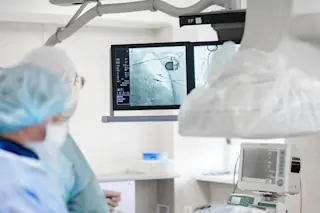A simple bike helmet may be the answer for researchers looking to study the brains of fidgety kids. With a few extra holes drilled in the top and a pile of chunky cables ballooning outward, the common piece of headgear could offer an alternative to stationary brain scans.
With a few tweaks, researchers from the U.K. equipped a commercial bike helmet with a magnetoencephalography (MEG) scanner, which uses magnetic fields surrounding the brain to detect activity. The highly sensitive sensors can pick up more nuanced data than can EEGs, which is why doctors commonly use MEG scans to find the origin of a seizure in a patient’s brain.
In a report published today in Nature Communications, the U.K. team argues that the wired-up helmet could be a useful device for future clinical studies on brain activity, especially in children. The helmet could allow researchers to observe subjects in more natural ...














